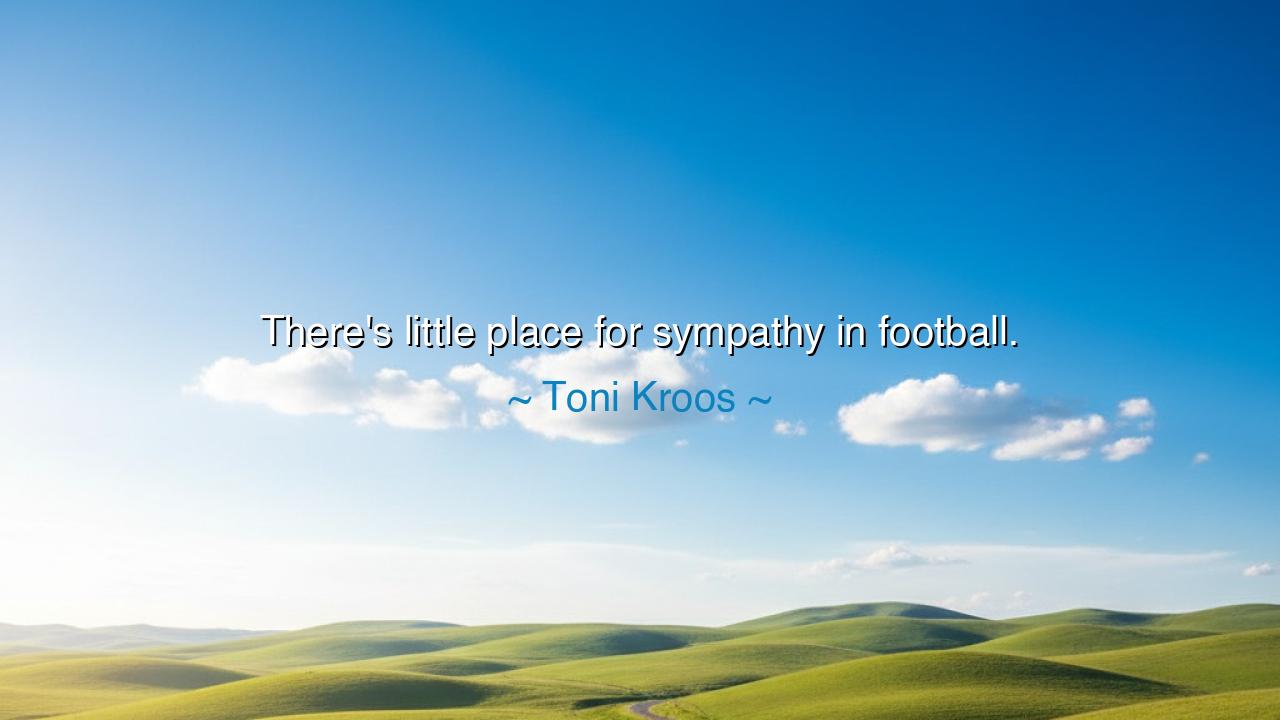
There's little place for sympathy in football.






Hear, O children of discipline and striving, the words of Toni Kroos, who declared: “There’s little place for sympathy in football.” His voice carries not cruelty, but clarity. For in the arena of sport, where victory and failure are measured by moments, and the eyes of nations rest upon the players, there is no room for indulgence. Compassion belongs to life, but in the crucible of competition, mercy yields to resolve, and sentiment bows before the will to triumph.
The meaning is thus: football, like many great endeavors, demands strength of mind and body beyond the ordinary. To falter is to lose ground, and to hesitate with pity is to sacrifice victory. Kroos reminds us that while sympathy has its place in the bonds of family and friendship, on the field of contest it can become a weakness. For the game is not played with soft hands, but with unyielding spirit. Here, the warrior must accept that every challenge will be hard, every opponent ruthless, and that the path to glory is carved not by pity but by perseverance.
The ancients too understood this. Consider the Olympians of Greece, who competed not for wealth but for the laurel crown. In their contests, there was no sympathy for the slower runner, no indulgence for the weaker wrestler. Each man entered the arena knowing that mercy would not save him—only excellence would. Their striving, fierce and unrelenting, forged the spirit of discipline that still inspires us today. Kroos, in his words, carries forward this ancient truth: that competition, by its nature, leaves little room for tender indulgence.
History gives us also the tale of Michael Jordan, who in the crucible of basketball demanded greatness not only of himself but of his teammates. Those who faltered were not met with sympathy, but with challenge, with the relentless call to rise higher. Some called him harsh, yet his way forged champions. Likewise in football, the greats are not made by being spared the trial, but by being tested until their strength is unbreakable. Kroos reminds us that sympathy, though noble in the home, cannot replace the fire needed on the field.
Yet let us not misunderstand. To say there is little place for sympathy is not to say there is no place for respect. For even the fiercest warriors shake hands when the battle is done, and even the hardest players honor their opponents. But in the heat of contest, pity weakens focus, while determination sharpens it. The lesson here is balance: cherish compassion in life, but in battle, be ruthless in pursuit of your goal.
The wisdom for us is clear: separate the arena of struggle from the hearth of compassion. When you face your challenges—whether in sport, in work, or in the trials of your own life—do not soften your resolve with excuses or indulgence. Face the trial with clarity, as Kroos teaches, knowing that sympathy will not carry you across the finish line. Effort, focus, and endurance alone will. But when the contest is over, return to your humanity, offer kindness, and embrace those who share the journey.
What then should you do? When you strive, strive fully. Do not beg for sympathy when life’s trials grow fierce—stand firm, sharpen your skill, and endure. Train yourself to welcome the test, for it is only in hardship that strength is proven. But when you see others endure their own contests, offer them respect, even when you cannot offer them mercy. And when you step away from your own arena, remember to restore balance with compassion in your daily life.
Thus let Toni Kroos’s words echo through time: “There’s little place for sympathy in football.” Not as a denial of kindness, but as a reminder of the nature of struggle. For in the places where victory is forged, pity falters, but strength endures. And those who learn to embrace this truth will stand as pillars of resilience, able to give their all in the contest and yet return, when it is finished, with hearts still capable of love.






AAdministratorAdministrator
Welcome, honored guests. Please leave a comment, we will respond soon